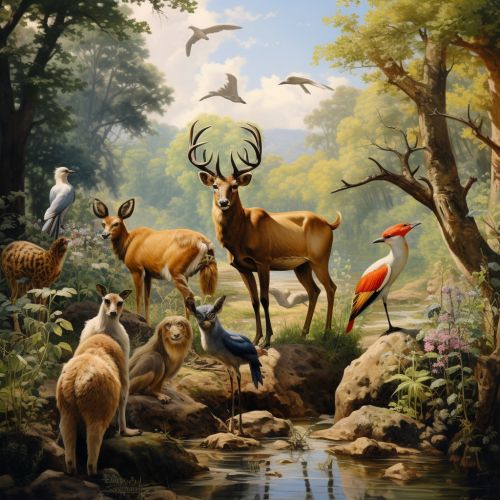Social Evolution
Introduction
Social evolution is a subdiscipline of evolutionary biology that is concerned with the investigation of social behaviors in both human and non-human species from an evolutionary perspective. It seeks to explain how and why certain social behaviors evolved, and the functions they might serve. The concept of social evolution has its roots in the ideas of Darwin, and has been developed further through the work of numerous scientists and theorists in the fields of sociobiology, behavioral ecology, and evolutionary psychology.


Theoretical Background
The theory of social evolution is based on the principles of natural selection and genetic drift, which propose that traits that enhance survival and reproduction will become more common in a population over time. In the context of social behaviors, these traits can include anything from cooperative hunting in wolves, to complex human societal structures.
Kin Selection
One of the key theories in social evolution is kin selection, which was first proposed by British evolutionary biologist W.D. Hamilton. Kin selection theory suggests that individuals are more likely to exhibit altruistic behaviors towards their relatives because they share a significant proportion of their genes. This is known as inclusive fitness, and it is a fundamental concept in understanding the evolution of social behaviors.
Reciprocal Altruism
Another important concept in social evolution is reciprocal altruism, a theory first proposed by Robert Trivers. This theory suggests that individuals may act altruistically towards non-relatives, with the expectation that the favor will be returned in the future. This form of social behavior is common in many animal species, and is thought to have played a significant role in the evolution of human societies.
Group Selection
Group selection is a controversial theory in social evolution, which proposes that natural selection can act at the level of the group, rather than the individual. This theory suggests that groups with more cooperative or altruistic members may have a survival advantage over less cooperative groups. However, the concept of group selection has been heavily debated and is not widely accepted in the scientific community.
Social Evolution in Non-Human Species
Social evolution is not exclusive to humans, and many examples of social behaviors can be found in the animal kingdom. These behaviors can range from simple cooperative behaviors in insects, to complex social structures in primates.
Eusociality
Eusociality is the highest level of social organization in animals, and is characterized by cooperative brood care, overlapping generations, and a division of labor into reproductive and non-reproductive groups. This form of social organization is most commonly found in insects, such as bees, ants, and termites, but has also been observed in some mammalian species, such as naked mole rats.
Cooperative Breeding
Cooperative breeding is a social system in which individuals other than the parents provide care for the offspring. This form of social behavior is common in many bird species, and is thought to have evolved in response to environmental pressures, such as a lack of suitable nesting sites or food resources.
Social Evolution in Humans
Humans are a highly social species, and the evolution of our social behaviors has played a significant role in our success as a species. The study of social evolution in humans is a complex field, encompassing a wide range of topics from the evolution of language and culture, to the development of complex societal structures.
Evolution of Cooperation
The evolution of cooperation in humans is a key area of study in social evolution. Cooperation is thought to have played a significant role in our survival and success as a species, and has been a driving force in the development of our complex societal structures. Theories such as kin selection and reciprocal altruism have been used to explain the evolution of cooperative behaviors in humans.
Evolution of Language
The evolution of language is another important aspect of human social evolution. Language is thought to have evolved as a means of social communication, and has played a crucial role in the development of human societies. The study of language evolution is a complex field, involving research in linguistics, anthropology, and cognitive science.
Evolution of Culture
The evolution of culture is a key aspect of human social evolution. Culture can be defined as the shared beliefs, values, and practices of a group, and is thought to have played a significant role in our survival and success as a species. The study of cultural evolution involves research in anthropology, sociology, and psychology.
